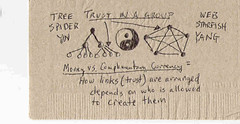 At SxSW (South by Southwest Conference) Tom Brown, Bijoy, David Bluestein, and I (with other bootstrappers) announced the launch of the BootKarma system. BootKarma is a complementary currency system meant to allow bootstrapping entrepreneurs leverage their time, especially in the early stages of their venture where cash is short. Essentially this is a formalization of a barter system among bootstrapping entrepreneurs. Note that the yin and yang tags are incorrect- and should be reversed. What this napkin design shows is how a formalized currency (like the US dollar) is structured by hierarchy (therefor not allowing everyone to participate unless they already have dollars) while on the right side, we see a complementary currency that can include anyone in a community with skills to leverage.
At SxSW (South by Southwest Conference) Tom Brown, Bijoy, David Bluestein, and I (with other bootstrappers) announced the launch of the BootKarma system. BootKarma is a complementary currency system meant to allow bootstrapping entrepreneurs leverage their time, especially in the early stages of their venture where cash is short. Essentially this is a formalization of a barter system among bootstrapping entrepreneurs. Note that the yin and yang tags are incorrect- and should be reversed. What this napkin design shows is how a formalized currency (like the US dollar) is structured by hierarchy (therefor not allowing everyone to participate unless they already have dollars) while on the right side, we see a complementary currency that can include anyone in a community with skills to leverage.
This scan of this napkin in a way shows a high level of design of the currency… a complementary currency is about creating trust and recognizing the bartering that is going on among different members of the community- and allows the facility of trade between members of the community that might not know each other… the power of this is in comparison to a barter system that only allows bartering to happen between people that know each other well.
What I find particularly insightful on Tom Brown‘s part is his design of BootKarma in this post about complementary currency and the Wooly Mamoth:
However, the promise of interest on money creates an incentive for selfishness. School (Rushmore) further conditions us to be selfish and government approved media’s main function is to exploit that conditioned selfishness. It’s no surprise that we tend to forget about the value of the ancestral gift economy. (original post here)
Bootstrap Austin already is using Enterprise Teaming’s system for managing commitments that are made between individuals and each other… what this underlying currency system represents is the opportunity to scale this system to many, many other entrepreneurs that want to work together in building their companies.
Tom sent me an email to give me some further insight about the distinction between barter and complementary currency systems. I want to make sure that this information is captured here- so I will include his full email to me in this comment- for others that are a part of this conversation. Here is his email to me. Thank you Tom for keeping me in the loop on this. By the way, Tom’s blog can be found at http://herestomwiththeweather.blogspot.com/
hi kevin,
with barter, there is a bilateral exchange of
goods/services for goods/services. this is taxed.
with complementary currency, goods/services are
transferred in one direction for a socially
agreed-upon payment in the other direction. this is
not taxed.
it’s more educational for the target audience to tell
them “complementary currency is not barter!” than to
say “complementary currency is like barter”
cheers,
tom
Dear Tom,
I would debate this. From my understanding “Barter” is a complementary currency. Complementary currencies are any currency that circulates alongside the national currency. Bernard Lietaer will reluctantly admit to this.
-Chris
Hi Chris,
I will reluctantly “admit” to it, too, but then what do we call a non-barter currency where goods/services only flow one way? If we call it money, then what do we call non-legal tender money?
i’ll go with the pretentious sounding common tender as it hopefully makes clear two important distinctions about these payments:
1. they are not barter
2. they have no legal rights
Hi Tom,
By “one way” I suppose you mean frequent flyer points? I believe you would call this a “loyalty points” complementary currency. It is debatable that this is “money” which has become a completely convoluted word. It depends on where your coming from. In the dictionary its says that money is “the current medium of exchange in the form of bank notes and coins.” But this is a total manipulation and total deviation from the Federal Reserves own definition of money. Money, I believe is anything that serves as a medium of exchange. But I digress.
hi chris,
sorry, i should have added the phrase “in a transaction” to the end of “what do we call a non-barter currency where goods/services only flow one way?”
because it is important to distinguish exchange (which includes barter) from payment (which does not), i use lietaer’s “means of payment” definition for money.
Hey guys, thank you very much for this discussion- I would like to take this discussion and enhance it with a tie into our wiki- we have an initial discussion (or statement about Complementary Currency) here (authored originally I think by Tom.) Would you guys be willing to share your thoughts together here so that we can develop this even farther? (If you would rather discuss this on the blog instead, that is cool too, either way). Here is a link to the page on complementary currency on the Exponential Entrepreneurship wiki.
Either way, thank you very much for your comments, I GREATLY appreciate them. Thanks!
I’ll make another iteration on the wiki after our next mutual credit system policy meeting on thursday.
you’re doing a great job spreading the word. i browsed technorati and the feedback from your sxsw presentation seems very positive (as i knew it would be)
cheers,
tom